Tennessee Ernie Ford
A Sad Life
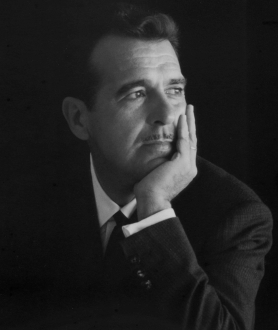
by Dennis Pollock
Most young people today would have no idea who Tennessee Ernie Ford was or what he did. It is kind of amazing that so many of the stars of yesteryear are nearly forgotten within a generation or two. In his heyday, Ernie Ford was the highest paid personality in prime-time American television. His records sold in the millions, and his concerts sold out. He hobnobbed with presidents and celebrities of all sorts, and was a major celebrity himself. His real name was Ernest Jennings Ford, but everybody knew him as “Tennessee Ernie,” “king of the “pea-pickers.” He was part comedian, part pop singer, part gospel singer, part television show host, part rancher, part hillbilly, and, well, pretty much part anything he cared to be. He was an intelligent man with a classic baritone voice, but many of his fans were certain that he was a hillbilly’s hillbilly.
If young people today know of him at all, it is probably for one of two reasons. First, he was immortalized by a two-part guest starring role on the I Love Lucy show (playing Lucy’s hillbilly cousin, of course). And secondly, he recorded a song which became a mega bestseller, called 16 Tons. You can still hear this song played on oldies stations, with its famous lyrics, “You load sixteen tons, and what do you get? Another day older and deeper in debt. Saint Peter don’t you call me, ‘cause I can’t go. I owe my soul to the company store.”
Ernie Ford was different from many celebrities then and now in that he was never particularly ambitious to make it as a star. His son, Jeffrey Ford, penned a touching biography of Ernie and wrote:
Dad didn’t land in Hollywood by design. He didn’t come to the town with stars in his eyes, dreaming of being discovered at Schwab’s. He never pounded the pavement looking for an agent or a break, never camped out at Central Casting, never worked as an extra hoping for a line or a close-up, didn’t do time in a chorus line, and was never anyone else’s second banana. It simply happened. “I fell into this business,” was the simplest way he could put it.
Roots
Ford was a part of what we now commonly call “the greatest generation.” He grew up during the great depression, served in the military during World War II, and rose to fame in the giddy post-war prosperity of the 1950’s. He did so many things well, it was hard to place him in a single category. And nearly all that he did, he did easily, making it appear effortless. In addition to his many talents, Ernie Ford was downright likable, with a charisma that shown brightly through radio and television, as well as in his personal life and relationships. His affability enhanced his singing and acting talents, and accounted for much of his success.
Ernie’s first experience with the entertainment world was quite modest. He began as a radio disc jockey. His deep, rich voice, and his amiable gift of gab made him a natural. In fact, he was such a natural that he soon became bored with doing radio the traditional way. Always a bit of an innovator, Ford engaged in certain practices that were just never done. One of them was his strange habit of singing along with many of the songs, through his live mic. Even though the song might have been originally sung as a solo, with Ford chiming in it became a duet. Almost no disc jockey but Ernie could have gotten away with this. But in Ernie’s case it worked. Of course, it helped that he had a magnificent voice, far superior to many of the singers whose records he was playing. Not only did he have a great voice, he had studied voice at the Cincinnati Conservatory of Music. Additionally, he had a near perfect ability to harmonize with a lead singer. The end result was that most of his listeners actually enjoyed and preferred the Ernie Ford enhanced songs.
Ernest Becomes “Tennessee Ernie”
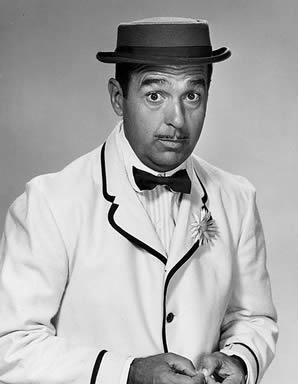 Ernie’s creative mind was always churning, and at one point in his disc jockey career he came up with an idea that would in some ways affect his career for the rest of his life. Ernie Ford decided to create a hillbilly persona for a thirty minute program each day. During this time period, he created a hillbilly twang and style perfected to such an extent that nearly all his audience assumed that the station had hired a new part-time disc jockey straight from the hills of Tennessee. “Tennessee Ernie” was the loud, goofy, over-the-top proprietor of the Bar Nothing Ranch. It wouldn’t fly today, but the corny caricature worked beautifully in that simpler time. It was different, it was lively, and it was an immediate hit. After the thirty-minute program was over, Ford reverted to his normal radio persona, Ernest Ford, and very few people realized that Ernest and Tennessee Ernie were one and the same. However, in a very short time Tennessee Ernie surpassed Ernest in popularity and fame, which no doubt produced in Ernie some mixed feelings.
Ernie’s creative mind was always churning, and at one point in his disc jockey career he came up with an idea that would in some ways affect his career for the rest of his life. Ernie Ford decided to create a hillbilly persona for a thirty minute program each day. During this time period, he created a hillbilly twang and style perfected to such an extent that nearly all his audience assumed that the station had hired a new part-time disc jockey straight from the hills of Tennessee. “Tennessee Ernie” was the loud, goofy, over-the-top proprietor of the Bar Nothing Ranch. It wouldn’t fly today, but the corny caricature worked beautifully in that simpler time. It was different, it was lively, and it was an immediate hit. After the thirty-minute program was over, Ford reverted to his normal radio persona, Ernest Ford, and very few people realized that Ernest and Tennessee Ernie were one and the same. However, in a very short time Tennessee Ernie surpassed Ernest in popularity and fame, which no doubt produced in Ernie some mixed feelings.
In his early DJ days Ford worked at smaller radio stations, but his life took an abrupt change when a man named Loyal King, owner of one of southern California’s most popular and powerful stations heard his 30-minute hillbilly shtick while driving. King was so impressed he had to meet this radio hillbilly and arranged an appointment with Ford. King was surprised to learn that “Tennessee Ernie” the hillbilly was the same person as Ernest Ford, the articulate DJ and newscaster with the beautiful singing voice. But this impressed him all the more and he immediately offered Ford a job with his station. Ernie had just landed a job with another smaller station, and had to turn him down, but King kept in touch and kept the pressure on until finally Ernie Ford moved to Pasadena and took a position with the powerful and influential KXLA radio station.
Meteoric Ascent
The rest is history. With the opportunity to reach a far larger audience than ever before, the amiable, innovative radio personality with the incredible singing voice saw a meteoric rise in popularity that soon went beyond southern California, and even beyond the shores of America. Jeffrey Ford writes:
Between 1948 and 1954 Dad did five years as a staff announcer at KXLA… signed with Capitol Records in 1949, hosted a national radio series for ABC for two years, signed for a coast-to-coast national radio series for CBS for two years, became the first Capitol act to headline the London Palladium, recorded three number one singles, guest-starred in the first two-part I Love Lucy episode ever filmed… played more than seven hundred live dates in clubs from the Copa to the Thunderbird, became the first guest host for NBC’s Kollege of Musical Knowledge, and signed with the network for his own daily (television) series, to begin in January 1955. In seven short, blistering, blurred years, he went from being a locally known DJ in Pasadena to being one of the most popular entertainers on two continents. Queen Elizabeth told the Daily Mail he was her favorite singer.
When Ernie went on air with his own television variety program in 1956 his star rose even higher. The program was produced by the Ford motor company (no relation) and in the first weeks, they tried to micromanage every aspect of the programs. They provided Ford canned jokes, straight men to stand alongside him, and urged him to be a little more sophisticated. None of it worked. Ford made it clear that he needed to do the show his way – just as he’d always done in his radio days. Finally, the producers relented and let Ernie be Ernie, and the show took off, landing consistently among the top five TV programs in the Nielsen ratings. Celebrities of all stripes were eager to appear as guests, knowing that the eyes of the nation would be upon them.
And could he ever sell cars! In those days, it was expected that the variety show hosts would serve as pitchmen for the companies that produced their programs. In Ernie’s case, the products were Fairlanes, Thunderbirds, Galaxies, and other Ford models. The man from Tennessee was so affable, so sincere, and so utterly natural that people believed him when he told them that life was far better from behind the steering wheel of a new Ford automobile. The auto company, seeing Ernie as a valuable asset, reciprocated and made him the highest-paid variety show host on television. The money poured in and Ernie Ford became a celebrity right up there with Bob Hope, Bing Crosby, Jerry Lewis, and Dean Martin. Life was good – at least professionally.
The Home Front
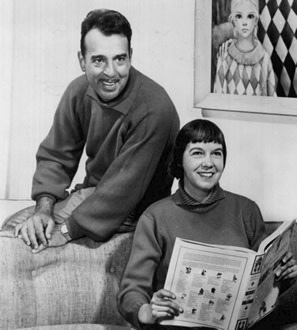
We often say that opposites attract, and never was this more true than in the joining of Ernie Ford and Betty Heminger in marriage. They were both humans, they both lived on planet earth, but other than that, they could hardly have been more different. Differences can be exciting and intriguing in the early stages of romance and infatuation, but once the rings are exchanged and the years begin to roll by, those differences can lead to huge problems if they are not dealt with and compromises are not made.
Ernie Ford was easy-going, laid back, and not particularly ambitious. Betty had a nervous temperament, was easily upset, worried constantly, and was highly driven. Betty was artistic by nature and in her early days dreamed of being a celebrity herself, but she soon realized that her husband would be the real “star” of the family, the one with whom everybody wanted to be seen and to schmooze. And while Ernie was not the hillbilly he sometimes portrayed, he did have a preference for blue jeans, ranches and country life over the glitz and glamor of Hollywood, rhinestones, and avant-garde ways. Betty, on the other hand, despised traditional styles and values, and leaned hard left in politics, in philosophy, and in style.
Although there seemed to be genuine love and affection between the two, in time their polar opposite ways and preferences brought about a growing distance and alienation. One thing they did have in common was that they both drank. But Betty drank far more than Ernie and became a full-fledged alcoholic while still relatively young. The combination of alcohol, emotional instability, a red-hot temper, depression, and a tendency to blame all her problems on those around her, primarily her husband, eventually made Ernie Ford’s life a living hell. The likable, funny, outgoing radio and television personality known and loved by millions had a home life that was the exact opposite of the image he projected in public. Although there were brief respites when their initial love and affection would resurface, those times would quickly pass and the darkness would resume. It was anything but funny.
Part 2: Tennessee Ernie Ford – A Sad Life
It may sound cold, but in many respects marriage, especially marriages entered into quickly and without a great deal of prayer, are simply a crapshoot. Apart from cases where couples have lived together for years (which God’s word strictly forbids) you don’t know what you’re getting into, and you really don’t even know who you are getting. Almost certainly the man or woman you dated and fell in love with is not the person you will live with over the years. During dating and courtship nearly everyone puts on their best face, minds their manners, and behaves quite differently than they will three years down the road. In addition, the power of fresh love is so strong that it colors and affects both the way we behave and the way in which we perceive our prospective spouse. Eventually, when time passes, emotions settle down, and various problems, issues, and difficulties bring us back to reality, we find out whom we have truly married, and what married life is all about. Welcome to the real world!
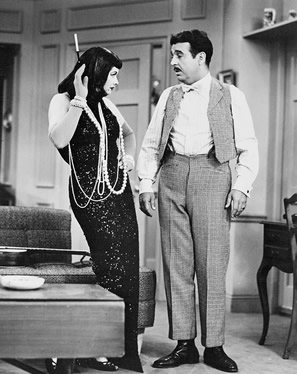 In Jeffrey Ford’s poignant biography, he writes about his father, the man the world knew as Tennessee Ernie Ford, and his mother Betty, and shares a great deal of the pain and struggle these two knew throughout their marriage. He tempers his reports of their growing alienation and frequent clashes with the observation that there were also periods of affection and laughter. But one gets the impression that their life together, especially in the second half of their marriage, was not very pleasant. And by their final years it was terrible.
In Jeffrey Ford’s poignant biography, he writes about his father, the man the world knew as Tennessee Ernie Ford, and his mother Betty, and shares a great deal of the pain and struggle these two knew throughout their marriage. He tempers his reports of their growing alienation and frequent clashes with the observation that there were also periods of affection and laughter. But one gets the impression that their life together, especially in the second half of their marriage, was not very pleasant. And by their final years it was terrible.
When Ernie Ford met Betty, he could hardly have helped being attracted to the vivacious, beautiful secretary. She was fun, she was smart, she was unpredictable, she was lively. She was the type of girl you could fall in love with in a few minutes’ time. And that was exactly what he did. He had no way of knowing that in time, with constant and liberal doses of alcohol, her sharp wit and lively nature would turn on him and everyone else who gave her the least bit of annoyance, and that she would prove a continual source of embarrassment. Jeffrey writes:
As the years progressed and the darkness claimed another inch of the aura of light around her, the laughter could, and would, be shut off like a spigot, and in its place would come forth a scalding stream of bitter sarcasm and derision, unlooked for, unexpected, and aimed nearly always at Dad. Her loss of happiness, her failings, the kids’ lack of direction, the decline of his career… She laid it all at his feet… Her attacks rarely failed to find their mark. I know he was wounded by those salvos, and yet it was well into the fading years of their lives before I ever detected any pain in his eyes. Until he eventually tired and sought solace on the deck of the Cutty Sark, he would simply absorb the blows, endure the darkness and embarrassment, and wait for the day to break.
Descent into Darkness
As her husband’s star rose higher and higher, Betty’s drinking and disintegration became more and more pronounced. She not only drank more, she started drinking earlier in the day. Eventually she would add tranquilizers and various prescription drugs to the mix. She drank at home and she drank in public. She showed up at parties and public events totally smashed. She had never been a particularly restrained personality, and now as a flaming alcoholic she lost nearly all her remaining inhibitions. She mocked people she didn’t like. She used sarcasm as a deadly weapon. She cursed freely, creatively, and with great passion. She and Ernie became truly the Odd Couple. Whereas Ernie was affable, polite, and gentle, she was a loose cannon, an unpredictable time bomb, a seething volcano certain to eventually erupt.
For many years, Ernie’s public response to his ever-disintegrating marriage was to fake it. In a rambling book filled with anecdotes and country humor, he frequently bragged on his wife and gave his readers the impression that theirs was the ideal, all-American family. When press and photographers were allowed into their homes they posed for photos that portrayed a wholesome, loving, happy family. There were pictures of Mom being kissed by her sons, pictures of Ernie and Betty on the golf course with their golf clubs in hand, and pictures of the beaming couple in Hawaii, necks covered with garlands of flowers. And all those smiles – every picture of the couple must be taken with huge, wide smiles on their faces, as though they were constantly having the time of their lives.
The Hymn Singer
During his years as a TV show host, Ernie began a practice that was at that time unique, and has never been done since on any nationally syndicated program. He ended each program with a Christian hymn. NBC was strongly opposed to it at the beginning, but Ford was determined to do it, and the network grudgingly allowed it. The hymns became enormously popular and they began receiving over a thousand letters each weak in appreciation. Eventually Capitol Records compiled a series of his hymns into an album, simply titled Hymns. The album became a huge bestseller and eventually went platinum with over a million in sales. Success always calls for more of the same, and this was followed by another gospel album, and then another. The record company, and Ernie as well, milked it for all it was worth. And it was worth a lot!
Ernie Ford is often remembered as a gospel singer and a Christian artist. But like so much in his career he never really sought it; he just sort of “fell into it.” The truth is that Ernie was more of a cultural Christian than a radical born-again, evangelical. One particularly clear evidence of Ford’s lack of an evangelical faith is found in what he wrote about the Bible:
My Bible is not the only Bible. Other faiths have other scriptures, and whether you call it the Torah or the Koran or the Old Testament or the New Testament, it makes no difference. All religions agree on the basic relationship between God and man and the need for sincere devotion.
These are words that would be strongly opposed by any evangelical. Ernie Ford’s faith was clearly of the generic type. He and his family were members of various churches throughout their lives, but they did not attend regularly. Whatever Christian beliefs that may have resided in Ernie’s mind and heart, it was not reflected much in their family life. Son Jeffrey writes:
Contrary to popular belief, Ernie Ford was not a particularly religious man… Religion did not dictate our habits or customs, it did not govern our lives, and we did not live by the lyrics of the hymns that provided the income we lived on… Brion and I knelt by our beds and said our prayers, but not every night. And more often than not, we prayed that Mom would not come in with a belt after (drinking). If she did we prayed her aim would be accurate, because the leather falling on our legs or our backs was way worse than on our backsides. And we prayed that Dad would take pity on us and intervene sooner and not later.
Conservative to the Core
The modern word to describe such a family life would be dysfunctional. The amazing thing about it is that the marriage and this incredibly unstable family did not explode, spewing its misery and ugliness everywhere. The major reason the marriage and the family held together was Ernie Ford himself. Ford was stubbornly old-school, traditional, and conservative by nature, as were so many of his contemporaries in that “greatest generation.” He did not approve of marijuana, he did not protest the Vietnam War, he did not like the long-haired look of the hippies, and he most certainly did not believe in divorce. Today, most men would leave a wife like Betty in a heartbeat, but Ford seemed never to seriously consider it. When asked by his son how he could manage to bear with his volatile wife, he apologetically replied, “This is my lot in life. So be it.”
Although Betty could not see it or appreciate it, Ernie Ford was probably one of very few men who could ever have endured her. For much of his life Ernie would patiently wait for her storms to pass, and then carry on as though nothing had happened. He felt this was his duty and he determined to make the best of it.
Ford was not the perfect husband, however. He found escape in work and since Betty showed no interest in traveling with him for concerts and appearances, they were frequently apart. Marriage to Betty wasn’t so difficult when hundreds or thousands of miles separated them from each other. As they aged, new music and new styles emerged and Ernie made no effort to keep up. He sang the same way he always did, and his audiences became smaller and older. This didn’t seem to bother him, since being a major star and a popular celebrity never meant as much to him as to most famous figures. As Ernie and Betty aged, he became more conservative and she more liberal. While Ernie sang songs such as Amazing Grace and Blessed Assurance, Betty explored transcendental meditation, yoga, and bought her teenage sons sexually explicit novels and in one case a book of nudes in various poses in trees, on the beach, and on rooftops.
Self-destruction
Eventually Betty’s disintegration led to threats of suicide, and then to actual suicide attempts. Her constant threats and verbal attacks became so much a part of their everyday lives that they no longer had the effect one might expect. Once in a drunken rage she cursed her husband and son, went to the kitchen and grabbed a butcher knife, and locked herself in a room declaring she was going to kill herself. Ernie and his oldest son cleared the dining room table as though nothing had happened, and then Ernie went into the living room and turned on the television to watch the western TV show, Bonanza. When he finally did go to check on her, he found that this time she was true to her word. She was lying on the floor barely breathing. In one hand was the butcher knife (which she had not used) but in the other hand was an empty bottle of Valium, whose contents she had swallowed. She regained consciousness, and cursed her husband, taking up where she had left off before swallowing the pills. After a trip to the emergency room her stomach was pumped and she survived, but the rift between husband and wife grew greater still.
Ernie had borne with his unstable wife for decades but in his later years it became too much. He retreated into a world of his friends, golf, and watching television, and began to drink almost as much as his wife. He lost his beautiful singing voice, as well as his motivation to be productive.
The day came when Betty would again attempt to take her life and this time she would succeed. Ernie Ford quickly remarried but all his drinking had destroyed his liver, and within a few years he died of liver failure at the age of 72.
Nice – but Broken
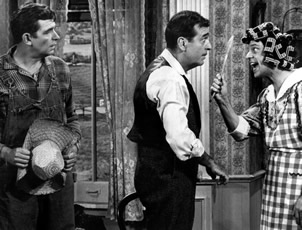
Still, the pressure finally did get to him. In his last years, Ernie drank so much that his alcoholic wife (totally smashed herself) once called her son and told him that she was worried about his father’s heavy drinking. What a mess! Ernie tried to cut an album in those days but showed up drunk for the recording session. In addition to his drunkenness, his voice was only a remnant of what it had been, and he had made no attempts to learn the lyrics of any of the songs.
The man who sang so many Christian hymns and recorded so many gospel albums did not seem to have the spiritual resources to keep his own life in order. Ernie had always been naturally a nice guy, a pleasant, personable man to whom nearly everyone could relate. But niceness is never really enough. Niceness can take you far, and it is surely superior to nastiness, but it is not enough. In the end, it is Jesus Christ who must be our strength, the One on whom we throw all our burdens. Ernie’s affability and beautiful baritone voice had taken him a long way. They had made him a rich man, a famous entertainer who was awarded The Presidential Medal of Freedom by President Ronald Reagan.
But in the nitty gritty of extreme and continual pressure, despite a noble desire to do his duty to his family, Ernie Ford eventually came apart. His collapse was not as dramatic or as colorful as his wife’s had been, but it was a collapse nonetheless. He died a broken man, an alcoholic who had spent decades worrying about his wife’s alcoholism. The one who sang such beautiful hymns and inspired so many millions of believers all over the world, finally collapsed under the weight of the phenomenal pressures he had carried most of his adult life.
True Strength
It would be wrong for us to judge him. None of us has walked in his shoes. But we can recognize that Jesus Christ is a far superior support to those living with extreme pressure than a shot of whiskey. Of course, support, strength, and comfort are not Jesus’ primary benefit. The major benefit of knowing Christ is that with our sins forgiven through His death on the cross, we will live forever as children of God. We are freed forever from the fear of the shadow of death.
But with the gift of eternal life, we also receive strength for this life. Whatever pressures we may face, whatever pain we may experience, whatever tears we may shed, we are more than conquerors through Him who loves us. Collapse under pressure may be natural but it is not inevitable. We can overcome, we can endure, we can triumph, even in the face of extreme pressure, through the grace of Christ.
We are not alone. We are not without resources. As we put our trust in Jesus, we will be upheld by the hands of a Savior who loved us, gave His life for us, and rose from the dead. And because He lives, we shall live also!
![]()
To see a full listing of all articles available, go to our Written Devos Page.
For a full listing of all articles as audio mp3
files (free downloads), go to our Audio Devos Page.
For inspirational devos, bios of Christian leaders, free downloads, and the latest SOGM news:
Your donations are needed and greatly appreciated!

















